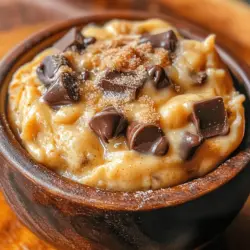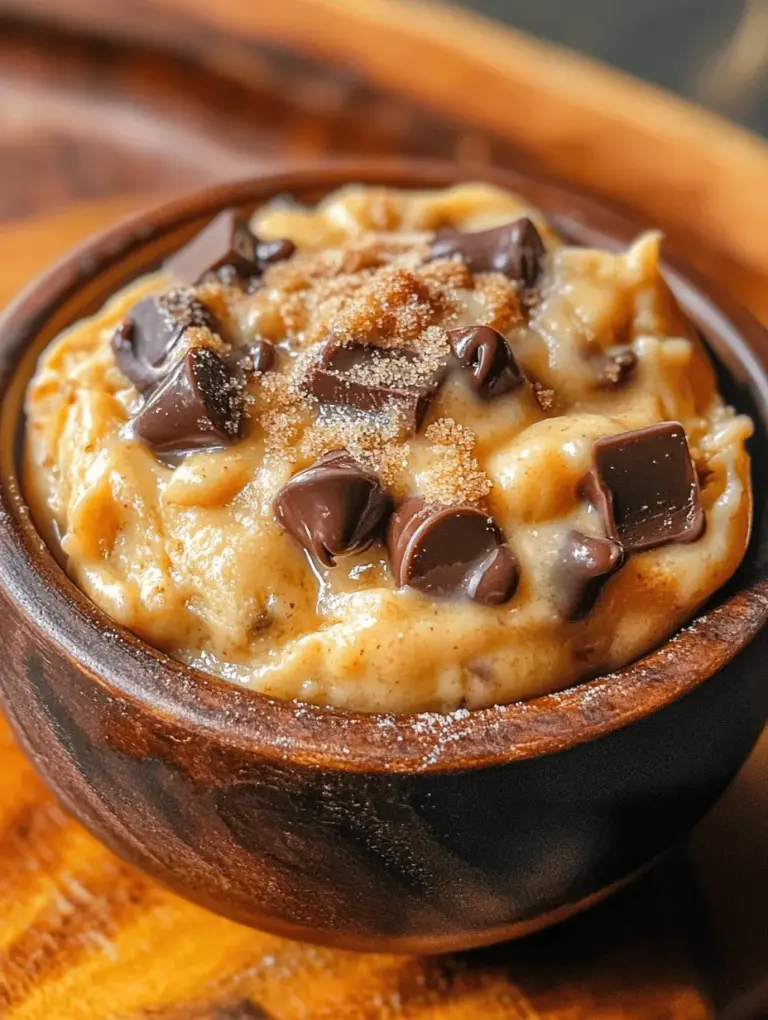Introduction to Delightful Single-Serving Edible Cookie Dough
In recent years, edible cookie dough has surged in popularity, captivating dessert lovers with its rich flavors and nostalgic appeal. No longer confined to the raw batter we might sneak while baking, this sweet indulgence can be enjoyed safely and guilt-free. The concept of single-serving recipes has taken this trend even further, allowing everyone to satisfy their cookie dough cravings without the commitment of making a whole batch.
Imagine having a delicious treat ready in just a few minutes, tailored specifically to your taste. This single-serving edible cookie dough recipe is an ideal solution for anyone yearning for a quick and delightful dessert. Prepared with safe ingredients and methods, it offers all the deliciousness of traditional cookie dough without the worry of raw eggs or unheat-treated flour.
As we dive into this recipe, we’ll explore the ingredients that make this edible cookie dough so irresistible and highlight the importance of preparation methods that ensure both flavor and safety.
The Allure of Edible Cookie Dough
The history of cookie dough as a treat goes back to the early 20th century, but it wasn’t until the late 1990s and early 2000s that raw cookie dough began to garner widespread attention. Its rise in popularity coincided with a growing trend of embracing comfort foods, and cookie dough emerged as a nostalgic indulgence that many people remember from their childhood baking sessions.
Culturally, cookie dough holds a unique place in kitchens across the globe. In the United States, it often serves as a rite of passage for budding bakers, who inevitably sneak a taste before the cookies make it to the oven. Meanwhile, in other cultures, variations of cookie dough-like confections can be found, showcasing the versatility of this beloved treat.
Comparatively, traditional baked cookies have their own charm, with a crispy exterior and chewy interior. However, edible cookie dough offers a different texture and experience—soft, creamy, and distinctly unbaked. This has led many dessert enthusiasts to choose cookie dough over cookies when it comes to their sweet cravings.
The trend towards single-serving recipes stems from a desire for convenience and personalization. Rather than preparing a full batch, which can be overwhelming and lead to excessive indulgence, the single-serving approach allows individuals to create just enough for one satisfying treat. This not only minimizes waste but also caters to those who want to enjoy a little bit of sweetness without going overboard.
Understanding the Ingredients
Creating delightful single-serving edible cookie dough requires a careful selection of ingredients, each playing a vital role in both flavor and texture. Let’s take a closer look at the essential components of this recipe.
Unsalted Butter
Butter is the cornerstone of any cookie dough, contributing to its rich flavor and creamy texture. In this recipe, unsalted butter is preferred to give you control over the overall saltiness of the dough. It melts beautifully into the mixture, creating a smooth and luscious base that enhances the taste of the other ingredients.
Brown Sugar vs. Granulated Sugar
The choice of sugar can significantly impact the flavor profile of your cookie dough. Brown sugar brings a deep, caramel-like flavor due to its molasses content, while granulated sugar adds sweetness without altering the taste. For this edible cookie dough, a blend of both sugars can create a well-rounded flavor that balances sweetness and depth.
Vanilla Extract
A splash of vanilla extract elevates the overall taste of the cookie dough, adding warmth and complexity. Vanilla’s aromatic qualities help to round out the flavors and make every bite even more enjoyable. When choosing vanilla extract, opt for pure vanilla for the best flavor—artificial vanilla can lack the depth that the real deal provides.
Salt
Though it may seem counterintuitive, a pinch of salt is crucial in sweet recipes. It works to balance the sweetness, enhancing the flavors of the other ingredients in the dough. A small amount of salt can make a significant difference, ensuring that your edible cookie dough is perfectly balanced and irresistibly delicious.
Heat-Treated Flour
One of the most important ingredients in edible cookie dough is heat-treated flour. Raw flour can harbor harmful bacteria, so it’s essential to heat-treat it before using it in your recipe. This process involves baking the flour at a low temperature to kill any potential pathogens while preserving its baking properties. Using heat-treated flour allows you to enjoy raw cookie dough safely.
Milk
Incorporating milk into your cookie dough enhances its texture and moisture content. It helps create a creamy consistency that is easy to work with and enjoyable to eat. Adjusting the amount of milk can also help you achieve the desired thickness of your dough.
Chocolate Chips
No edible cookie dough is complete without chocolate chips! These classic additions provide bursts of sweetness and richness, making every bite a delightful experience. You can opt for semi-sweet chocolate chips for a balanced flavor or try dark chocolate for a more intense cocoa experience. Additionally, feel free to experiment with other mix-ins like nuts, sprinkles, or even white chocolate chips for a personalized touch.
Step-by-Step Instructions for Making Cookie Dough
Ready to whip up your delightful single-serving edible cookie dough? Let’s break down the preparation steps to ensure a seamless baking experience.
Step 1: Gather Your Ingredients
Before diving into the recipe, make sure you have all your ingredients ready. You’ll need:
– 1 tablespoon unsalted butter, softened
– 1 tablespoon brown sugar
– 1 tablespoon granulated sugar
– ¼ teaspoon vanilla extract
– A pinch of salt
– 2 tablespoons heat-treated flour
– 1-2 teaspoons milk (adjust for desired consistency)
– 2 tablespoons chocolate chips
Step 2: Cream the Butter and Sugars
In a mixing bowl, combine the softened unsalted butter, brown sugar, and granulated sugar. Using a fork or a small hand mixer, cream these ingredients together until the mixture is smooth and creamy. This process helps to incorporate air, creating a light texture in your cookie dough.
Step 3: Add Vanilla and Salt
Next, add the vanilla extract and a pinch of salt to the creamed mixture. Stir well to ensure that the flavors are evenly distributed throughout the dough. The salt will start to bring out the sweetness, making your cookie dough even more delicious.
Step 4: Incorporate the Heat-Treated Flour
Gradually add the heat-treated flour to the mixture, stirring until fully combined. The dough might seem a bit crumbly at first, but don’t worry; that’s normal. As you continue mixing, the ingredients will come together to form a cohesive dough.
Step 5: Adjust Texture with Milk
At this stage, it’s time to add the milk. Start with 1 teaspoon and mix thoroughly. If the dough feels too dry, gradually add more milk until you reach your desired consistency. The goal is to have a soft and smooth dough that holds together well but isn’t too sticky.
Step 6: Fold in the Chocolate Chips
Finally, fold in the chocolate chips, ensuring they are evenly distributed throughout the dough. This is where you can get creative—consider adding other mix-ins like chopped nuts or different flavors of chips for a unique twist.
With these steps, you’re well on your way to enjoying a delightful single-serving edible cookie dough that satisfies your sweet tooth. Get ready to savor each creamy, chocolatey bite, and embrace the joy of homemade cookie dough, crafted just for you.
{{image_1}}
Importance of Creaming Butter and Sugars Properly
When preparing delightful single-serving edible cookie dough, the technique of creaming together butter and sugars is paramount. This process serves a dual purpose: it not only contributes to the texture of the final product but also impacts its flavor. By beating the butter until it is light and fluffy, you incorporate air into the mixture, which helps create a tender dough. The granulated sugar adds crispness, while the brown sugar brings a rich, caramel-like flavor thanks to its molasses content.
For optimal results, use room temperature butter, as this allows for easier creaming. Combine the sugars with the butter in a bowl and mix them together using either a hand mixer or a spatula. Aim for a light color and a fluffy consistency, which usually takes about 2-3 minutes of mixing. This crucial step ensures that your cookie dough will have a delightful texture that melts in your mouth.
Explanation of Heat-Treating Flour and Its Necessity
One of the essential steps in making edible cookie dough is heat-treating the flour. Raw flour can harbor harmful bacteria, including E. coli, which is why it is vital to treat it before consumption. Heat-treating flour involves baking it at a low temperature to kill off any potential pathogens, making it safe to eat.
To heat-treat your flour, preheat your oven to 350°F (175°C). Spread the desired amount of flour on a baking sheet and bake it for about 5-7 minutes. Allow the flour to cool before mixing it into your cookie dough. This step not only ensures food safety but also helps to enhance the flavor by toasting the flour slightly, resulting in a richer taste in your final product.
Mixing Techniques for a Perfect Dough Consistency
Achieving the perfect dough consistency is an art that relies on proper mixing techniques. Once you have creamed the butter and sugars and heat-treated the flour, it’s time to combine the ingredients.
Begin by gradually adding the heat-treated flour into the butter-sugar mixture. This is best done in increments to prevent clumping and ensure even mixing. After incorporating the flour, add any additional ingredients, such as salt and vanilla extract, which enhance the overall flavor profile.
When mixing, be careful not to overwork the dough. Overmixing can lead to a tough texture, which is not desirable in cookie dough. Instead, stir gently until all ingredients are just combined. The dough should be soft and slightly sticky, perfect for scooping or rolling into balls.
Tips for Incorporating Chocolate Chips for Optimal Distribution
The chocolate chips are the star of the show in any cookie dough, so it’s essential to incorporate them well for even distribution. To achieve this, consider using mini chocolate chips instead of regular-sized ones. Mini chips not only distribute more evenly throughout the dough but also provide a delightful burst of chocolate in each bite.
When adding chocolate chips to your mixture, fold them in gently with a spatula. This technique ensures that they are evenly dispersed without overworking the dough. If you prefer a more decadent treat, feel free to mix in a combination of chocolate types, such as semi-sweet, dark, or even white chocolate chips.
Nutritional Information and Benefits
When indulging in a single-serving of homemade edible cookie dough, it’s important to consider its nutritional content. Generally, a serving of this delightful treat contains approximately 200-250 calories, depending on the ingredients used. The cookie dough is rich in carbohydrates and fats, primarily due to the sugars and butter.
Making cookie dough at home allows you to control the quality of ingredients and tailor the recipe to your dietary preferences. For instance, you can choose organic sugars, grass-fed butter, or even use alternative sweeteners for a lower-glycemic option.
Customization Options to Cater to Dietary Preferences
One of the significant benefits of making cookie dough at home is the flexibility it offers. If you’re looking for gluten-free options, simply substitute all-purpose flour with almond flour, coconut flour, or a gluten-free flour blend. For a vegan version, swap out the butter for coconut oil or a plant-based butter substitute, and replace the chocolate chips with dairy-free options.
This recipe also allows for a balance of indulgence and responsible eating. By controlling the ingredients and portion sizes, you can enjoy a satisfying treat while still being mindful of your overall dietary choices.
Creative Variations on the Classic Recipe
Once you’ve mastered the classic edible cookie dough recipe, consider exploring several creative variations to keep things exciting.
Suggestions for Ingredient Substitutions
For those looking to experiment, try substituting some of the flour with rolled oats for a chewy texture. You can also replace half of the sugar with maple syrup or honey for a natural sweetness that adds a unique flavor profile.
Flavor Variations
To switch up the flavor, consider adding spices such as cinnamon or nutmeg, which can give your cookie dough a warm, cozy feel. You might also experiment with citrus zest, like lemon or orange, for a refreshing twist.
Alternative Mix-Ins for a Unique Twist
Don’t hesitate to add nuts, such as chopped pecans or walnuts, for an added crunch. Other mix-ins could include dried fruits like cranberries or raisins, or even unique ingredients like peanut butter chips or toffee bits for extra richness.
Seasonal Adaptations
Tailor your cookie dough to the seasons by incorporating seasonal flavors. In the fall, try adding pumpkin spice or even a touch of pureed pumpkin to the mix. During the winter holidays, consider adding peppermint extract or festive sprinkles to create a holiday-inspired treat.
Storing and Enjoying Your Cookie Dough
Once you’ve created your delightful cookie dough, you might be wondering how to store it for later enjoyment.
Best Practices for Storing Edible Cookie Dough
To keep your cookie dough fresh, store it in an airtight container in the refrigerator, where it will last for up to a week. If you prefer to store it for more extended periods, consider freezing it. Roll the dough into balls and place them on a baking sheet lined with parchment paper. Freeze until solid, then transfer the frozen balls to a freezer-safe bag for up to three months of storage.
How to Chill for a Firmer Texture
If you prefer a firmer texture, allow your cookie dough to chill in the refrigerator for at least 30 minutes before serving. This time will help solidify the fats and enhance the overall flavor.
Serving Suggestions
There are countless ways to enjoy your edible cookie dough. For a classic approach, simply scoop it straight from the bowl. Alternatively, you can serve it as a topping for ice cream or yogurt, creating a delightful dessert that elevates your treat to the next level.
Pairing Ideas with Other Desserts or Snacks
Consider pairing your cookie dough with a warm brownie or a slice of cake for a decadent dessert experience. You could also use it as a filling for crepes or spread it on toast for a fun breakfast option.
Conclusion: Savoring the Simple Joy of Edible Cookie Dough
In summary, the delightful single-serving edible cookie dough is not only simple to make but also incredibly satisfying to enjoy. The combination of creamy, sweet dough with the rich flavor of chocolate chips creates a treat that is hard to resist.
Feel empowered to explore the variations and customize the recipe to suit your taste and dietary preferences. The joy of creating and indulging in homemade treats lies in the ability to experiment and make the recipe your own. So gather your ingredients, embrace your creativity, and savor every bite of your delicious edible cookie dough!


